How to Make a Booking Website for a Tourism Business

Travel and tourism are said to account for one in every ten jobs in the world. Their growth is driven by the rising disposable income of the population, demand for corporate travel, and shift towards the “experience” economy. Simultaneously, tourism businesses are undergoing a digital transformation.
Modern travelers are not only blessed with an abundance of destinations and transportation and stay options. Internet and mobile technologies empower them to arrange a journey more conveniently than ever before. As a result, global online sales of airline tickets, cruises, hotel rooms, accommodations, and transportation are growing, totaling around $694 billion in 2018.
A booking engine is the heart of any online travel or hospitality business, but it can be valuable for virtually any enterprise. We regularly publish ‘how-to’ articles in this blog, e.g., the one about messengers lately. Today, let us share first-hand advice on how to make a booking website.
Why Create Booking Websites and Mobile Apps in the First Place?
An online booking system ensures the accessibility of real-time information to customers and employees. A traveler may book a hotel room or bus ticket directly from the company’s website, online travel agency (OTA), aggregator site, or off-line (on the phone or in the company’s office), and the data will be simultaneously updated in the booking engine and all distribution channels. This largely eliminates the risk of overbooking and information loss.
The more steps between a customer and their purchase, the less likely they’re to make it. A convenient online reservation system that reduces those steps is valuable for anyone who schedules appointments or takes bookings of any kind. Since more leads can simultaneously interact with the system than with a human agent, more reservations can be made, increasing sales. It also means a reduction of workload and mistakes by human employees. Smoother personalized customer experiences will drive repeat business.
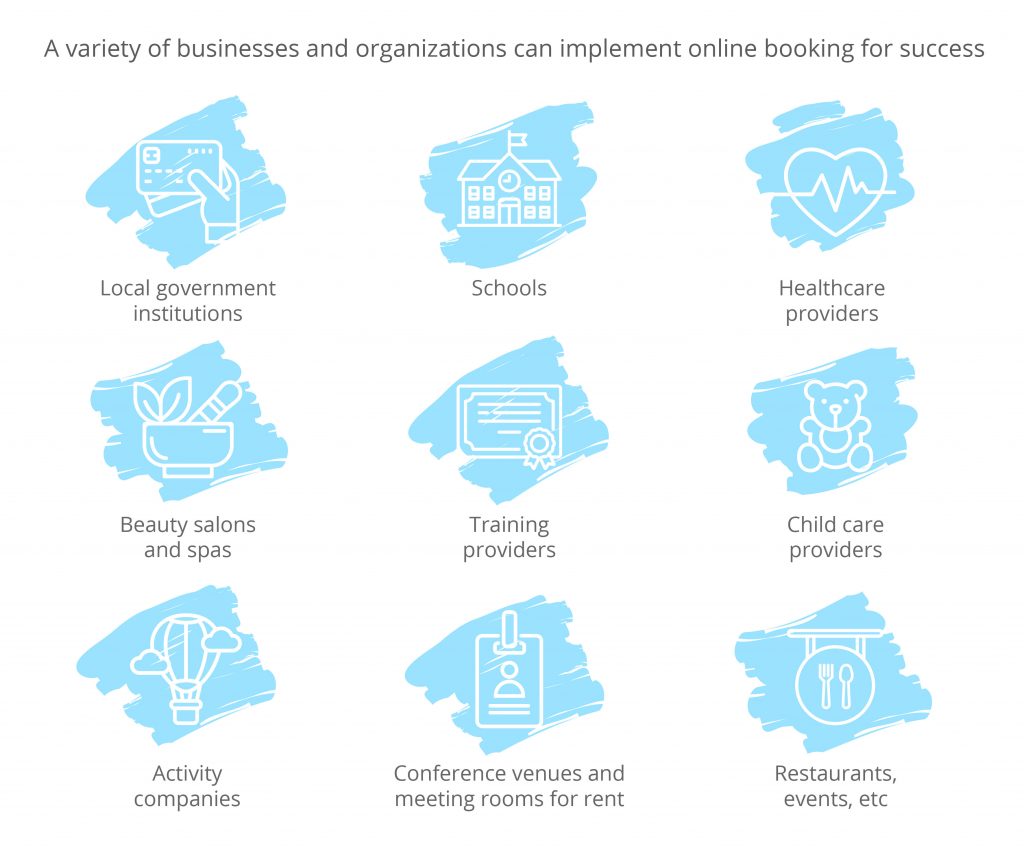
If you’re a tech entrepreneur, an online booking system is perfect for bringing together the greatest variety of consumers and service providers. The revenue streams can be rich as well, including fees, commissions, subscription, affiliate programs, app as a platform, and ads.
Once you’re convinced of an online booking system’s benefits, implementation is the next thing to consider. Companies have several options for a ready-made booking system integration. The choice depends mainly on a website’s content management system and budget. For example, WordPress offers free and paid templates for hotel booking websites.
Those who want a unique product tailored to the specific needs of their company and customers may choose to create a booking web app from the ground up.
How to Create an Online Booking System
An online booking system consists of:
- Back-end, a database that stores information, e.g., about travel products or other resources to be scheduled;
- Front-end, the web pages that present this information and retrieve forms from the user;
- Middleware, the software that moves data between the database and the web pages.
The conceptual database development processes should start with the creation of a database diagram. If you are using a database with a graphical development interface, you can use the diagram as the future database structure.
The diagram should include several tables. The first should contain the resources that will be booked. It can be hotel rooms, fishing trips, or whatever services your business offers. The second table should determine the dimension used to book the resources. Usually, it’s a calendar.
You’ll want to structure your resources and dimensions for complex scheduling. For example, a booking website may offer loyal customers car rentals in addition to complete travel packages. To schedule combinations of these, you’ll be pulling information from multiple tables.
All these tables should be built in your database system. Dummy information is necessary for testing the system as you’re building it.
The front-end web pages typically include an introduction, a search function for requesting information from the database, a response page showing the requested info, forms where users must enter and submit new info, and confirmation pages. For example, on a hotel’s website, a user may view pictures and read reviews, search for rooms that are available on specified dates, and then submit the required data to book a selected room.
The middleware will be processing users’ input, pulling information from the database’s join table as necessary, and submitting new data back into that table.
The deployment of the database, web pages, and middleware should be tested with various booking options. Booking databases usually begin with simple structures and gradually expand to deal with more complex needs. Both the database and middleware systems should be scalable to handle growing booking requirements.
MySQL is the most popular database, and PHP and Python are the most popular choices for middleware. This is a scenario for the LAMP stack, but suitable combinations of web and mobile development, database, and middleware technologies are numerous and varied.
Actually, businesspeople needn’t know exactly how to create an online booking system. Leave the job to web and mobile app developers. What you should know is how the system will meet your unique business needs. This understanding will help you make better informed decisions and empower the entire team throughout the product development process.
The next chapter provides tips on what to consider during all stages of building your website booking system.
How to Make a Booking Website for a Travel Business
Research and ideation
Generally, there are three business ideas behind a travel booking app development:
- booking aggregator;
- application for a company’s own airlines, hotel chain, or other business;
- a combination of the two.
Booking aggregators provide users with price comparisons across multiple connected reservation platforms. After a user chooses the most appropriate offering, the website usually redirects them to an actual booking platform. By doing so, booking aggregators get a referral commission or cost-per-click charge.
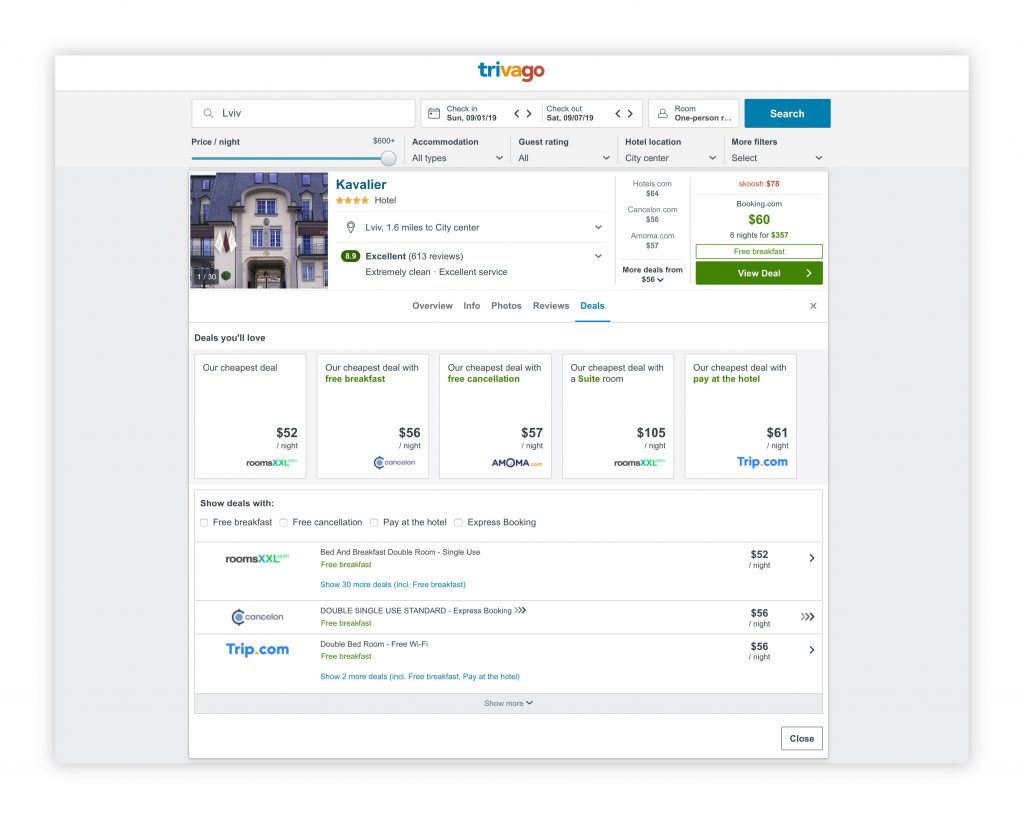
Because many travelers prefer to have a one-stop app for planning, booking, and in-destination navigation, TripAdvisor and some other booking aggregators have their own booking functionality now.
Booking aggregators are the most common type of travel reservation apps. If you decide to create another one, you will be competing with leaders like Booking.com, Hipmunk, Hotellook, Hotels.com, Kayak, or Skyscanner.
Service providers follow the second approach. It’s best to develop a brand app if your business is big enough. However, for smaller businesses, attracting direct bookings can mean an ability to sell at higher rates. An efficient modern website increases brand awareness, creates new customer streams, and helps maintain a loyal customer base. It also means a greater outreach, e.g., to foreigners looking to explore your locality.
You can also create a booking web app with the hybrid approach. It will be aggregating offers from the top online booking services and offering travel products from your business(es) simultaneously. On one hand, it will attract many users and earn additional income. On the other hand, it will increase your brand awareness by proposing offers for your travel business.
Another critical question is whether you should run your app globally or focus on a local market. It may be better to cover as many countries and cities as you can. However, if you are building a booking application for your family-owned hotel or local tours, it’s reasonable to start locally. When your online travel business grows and user feedback helps you refine your website booking system, you can shift to the hybrid business model and expand your reach.
Meet the consumers’ needs
Whatever your business model, all travelers expect that a booking web application should primarily:
- find what they’re looking for quickly
- offer the best deal
- book the item quickly and smoothly
There’s also the ‘experience’ aspect, but that belongs in the user experience and user interface (UX/UI) design stage. At the initial stage, you should concentrate on the above three customer expectations.
With most apps, consumers can primarily book a flight, hotel, package holiday, cruise, or sightseeing tour. You can make your website experience stop at booking or follow through the whole travel cycle. Do your target audiences need a one-stop solution? In that case, everything they need may be provided on a single website, e.g., travel-related shopping, local tourist attractions and restaurants, other travelers’ stories and insider’s secrets, car rentals, event ticket booking, and so on. Brand applications may cater to users during the trip, for example, helping with on-site navigation or allowing to order extra services while staying in a hotel.
Develop your unique value proposition (UVP). Remember that online travel shopping is prevalent in the last minute segment. Most travelers will be looking for the cheapest travel options and accommodations first. It may be smart to specialize in offering deals on same-night bookings. If you want to concentrate on millennials and low-budget travelers, offer reservations at hostels and hotels for backpackers.
Affordable yet personalized travel experience is an excellent UVP. Airbnb became a leader thanks to its unique business model, mass-market targeting, and global coverage. Misterb&b, which Alternative-spaces helped develop and maintain, went further. The website and mobile application help members of the gay community travel the world more safely. While booking gay-friendly accommodations, the users are also supporting LGBTQ non-profits.
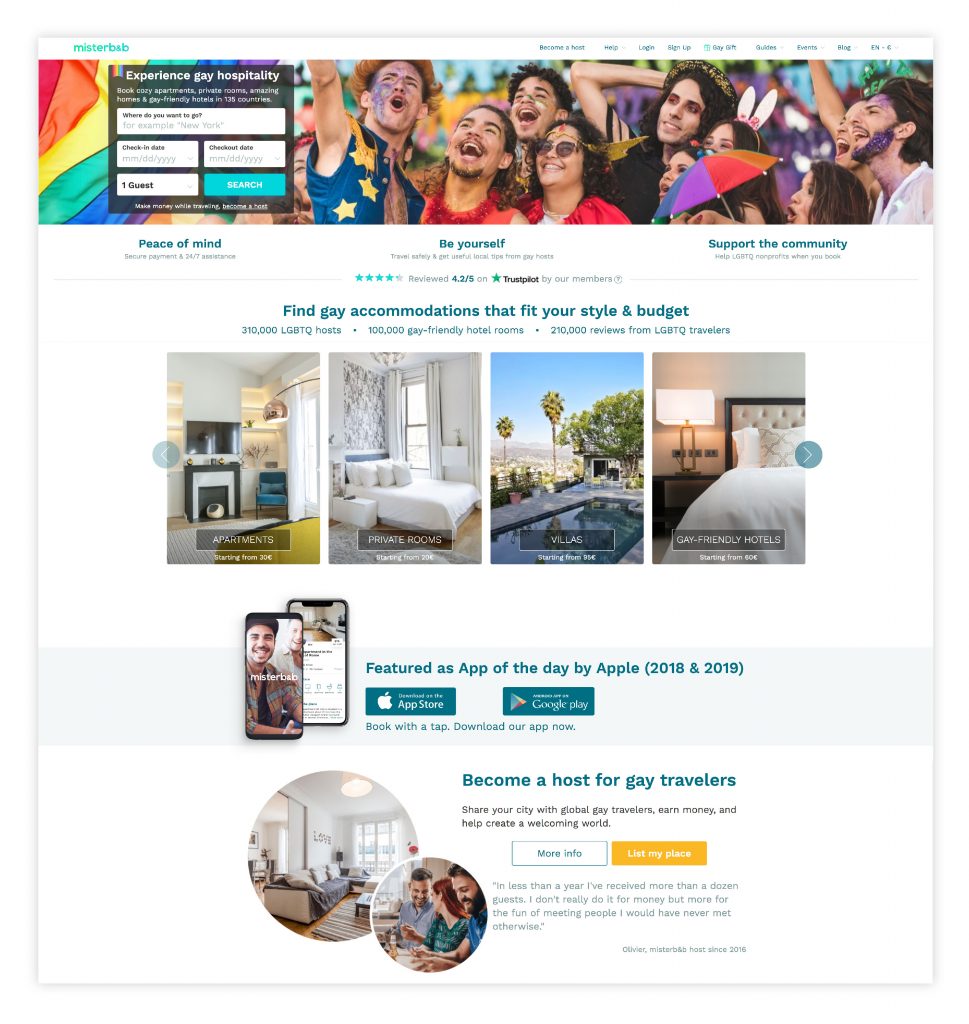
Sustainability is another factor driving accommodation decisions. 73% of global travelersintend to stay at least once in an eco-friendly or green accommodation when looking at the year ahead. 70% say they would be more likely to book an accommodation knowing it’s eco-friendly. Whatever your UVP idea, make sure the website’s name reflects the specialization.
Develop your monetization strategy
Most of the travel apps’ revenue comes from selling hotel reservations. Most online booking websites use advertising, agency, or merchant models.
Advertising
Your company can charge for placing banner ads or for redirecting visitors to partner sites. For example, TripAdvisor mobile app is driven by advertising. Hipmunk and Kayak earn their revenue on flights and hotels by charging cost-per-click to OTAs and airline and hotel websites. This model is the most affordable and can be a great match for a new small travel application. Ads may be useful if they inform about special offers, ongoing events, discounts, etc. However, excessive, irrelevant advertising can spoil a website experience.
Agency
OTAs, which act as a middleman between the industry operators and consumers, take a commission on every transaction. This model can be risky for a new booking application. It may be better to start with a lower commission, gain the trust of the service providers and consumers, and only then consider charging a commission, up to 25%.
Merchant
An OTA buys flights, hotel rooms, or other services in bulk at a wholesale rate and sells them with a retail margin; the consumers pay via the OTA’s website or mobile app. OTAs have to buy up significant numbers of items and then market them to users at the agency’s rate.
For broader market coverage, OTAs tend to combine the merchant and agency models. So does Expedia, for example, but it mostly relies on the merchant model which offers higher margins.
There are a few more possible ways to monetize your travel application. For example, in an affiliate partnership, website owners can earn money by connecting to popular hotel booking platforms like Booking.com or TripAdvisor. You may also charge users a fixed fee for booking services. In some cases, hotels or other businesses using a website can pay its owners for some extra features. It takes knowledge of the target audience, creativity, and some experience to develop features that businesses and consumers would eagerly pay for.
Identify the core features
Back-office software empowers you to administer the websites, manage all reservations, bills, and accounts, and control enterprise productivity, very much like enterprise resource planning systems at other companies. Back-office features must include at least:
at other companies. Back-office features must include at least:
- Customer relationship management for interactions with customers
- Content management system for uploading and managing the website’s content
- Travel products availability management
- Consumer loyalty program management
- Customer support
The essential features of the front-office should follow the user journey:
- Search and evaluation
- Selection
- Booking / payment / opt-out
Arrange the essential features to help the user achieve the goal as quickly and smoothly as possible. The search parameters should start with:
- Destination (city, property name or address)
- Date (arrival and departure/check-in and check-out dates)
- Number of persons (adults, children, and possibly pets)
- Number of rooms or type of accommodation
Include the ability to find hotels nearby and to enable GPS navigation. Users may need to pick a location based on its proximity to the sights of interest they plan to visit.
On the results page, users see listings that match their initial parameters. Filters and sorting can provide refinement. For example, filters of hotel booking apps enable users to see the cheapest options or the hotels with the highest user rating first. It’s easier to choose when users see the accommodations’ prices and ratings on a map.
The following accommodation details are essential:
- The hotel’s address, description, check-in/check-out time, hotel policies, places of interest nearby, etc.
- Hotel photo gallery
- Map with the hotel location and environs
- Amenities (e.g., Wi-Fi, accessibility, parking places, etc.)
- Reviews and the average score
- A list of bookable rooms, with pictures, descriptions, and price per day
- Cancellation details
- Pricing block with offers from different booking systems
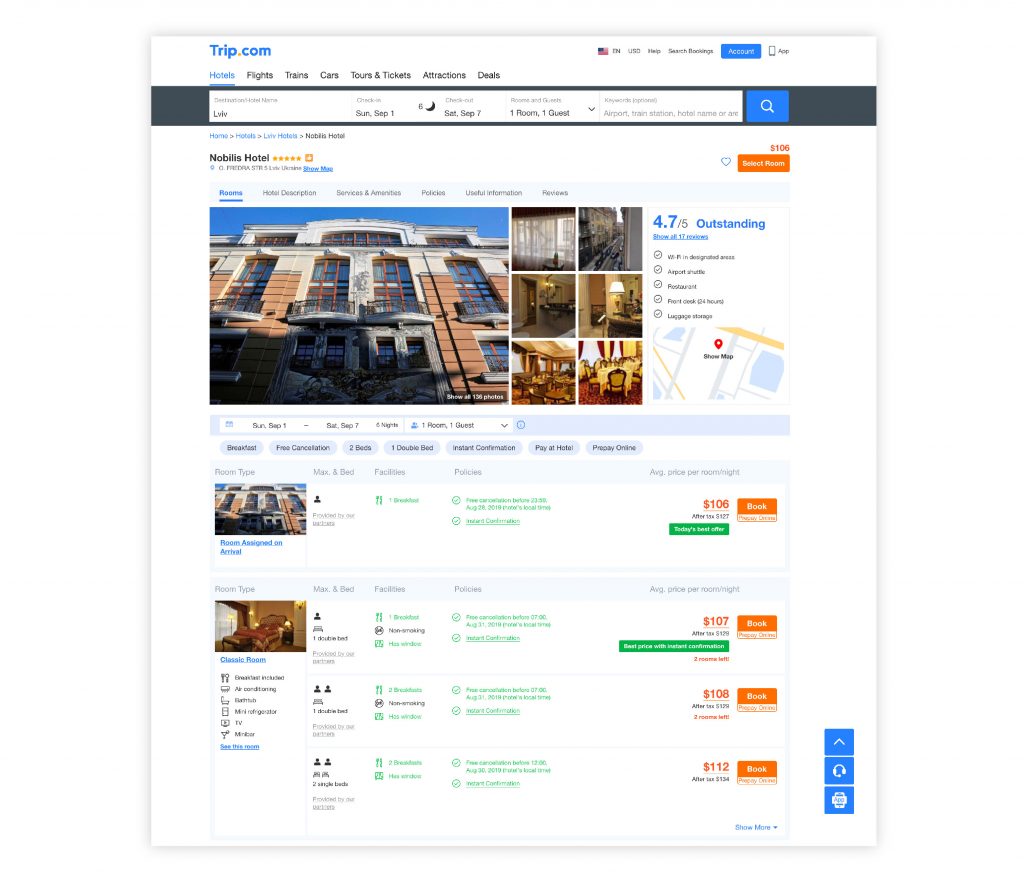
It’s also useful to include:
- Room status that shows a rooms’ availability in real time;
- Social share buttons;
- Incentives, e.g., for every ten nights booked with your web or mobile app, users get one free night in any available hotel;
- Suggestions of other matching options and additional items.
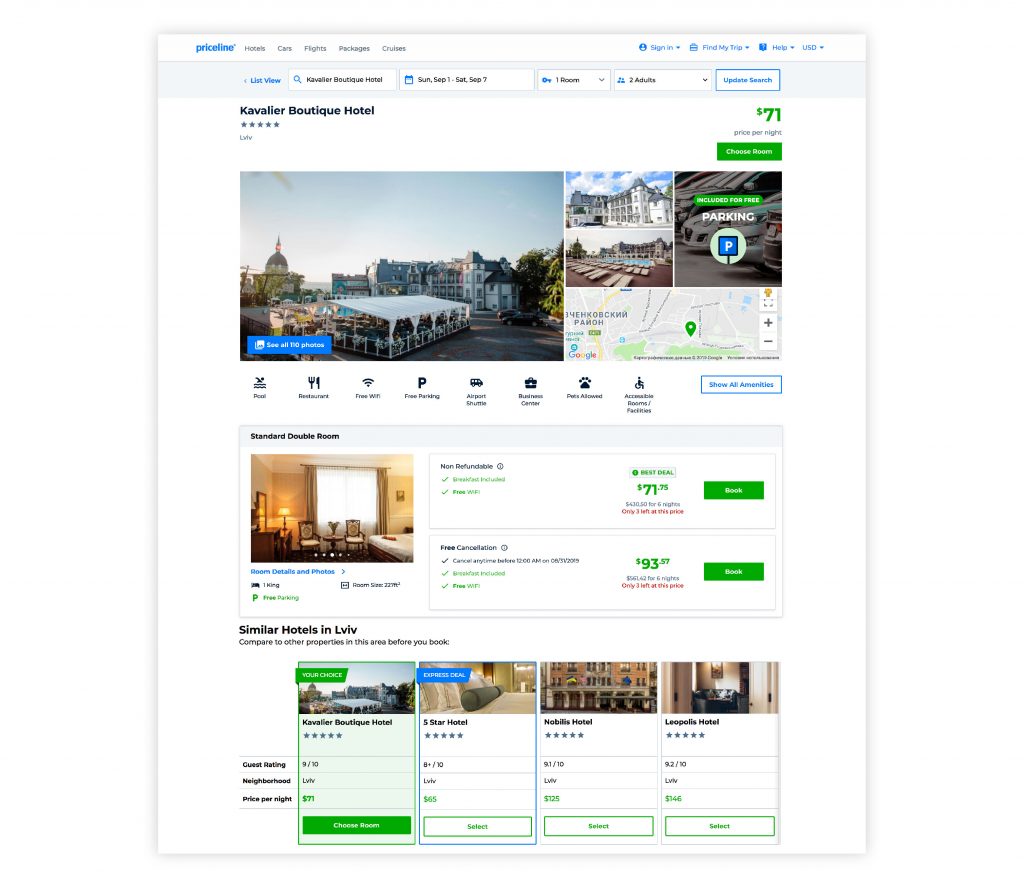
If you offer extra services at the time of booking, you can increase both customer satisfaction and revenue.
A quality application should offer both a fast and secure payment service and the ability to pay at check-in. If a user wishes to pay in advance, they should see the total amount and the payment by days. Multiple trusted payment options (credit card, debit card, PayPal, etc.) will help to ensure a good user experience and reduce the number of abandoned transactions. Email the online receipt to the user automatically. The printable reservation confirmation should include all payment details.
Push notifications can help you keep customers informed about relevant services, discounts, and changes. This is why a progressive web application and then a mobile app should be considered.
Registration should be optional, but make sure to suggest it once a booking is made or if a user returns. Users should be able to sign up via email or their Facebook or Google account. The user profile will store the customer’s information, booking history, ongoing reservations, and wish-lists, as well as allow users to change their language, currency, locale, time zone, and other settings. The collected data will enable the website to make personalized offers and discounts.
Consider implementing a customer feedback, review, and rating block into your travel app. This feature is extremely valuable: almost all leisure travelers read several reviews before booking their holidays. Customer feedback enables you to improve your web application and your business. It also shows that you care about the customers and their travel experiences. After a guest’s check-out, send an automatic email encouraging them to leave a review on the hotel’s website, social networks, and popular online travel review sites. It’s also useful to encourage user-generated content like stories, insider’s tips, etc.
The priority and nice-to-have features are not difficult to select because nearly all travel booking websites do much the same. The trick is how to make a booking website experience unique.
Make your travel booking website special
The following features can significantly enhance pre- and post-booking customer satisfaction:
- Your website booking system can provide personalized recommendations based on the users’ search history, as Netflix and YouTube do. It can be alternative dates, flight and hotel deals, local events, and so on. The more customer data is accumulated, the more accurate results the algorithm will yield.
- Airfare, accommodations, and other travel product prices fluctuate. Thanks to plenty of data on seasonal trends, and airlines’ and hotels’ special offers and deals accrued over the years, predictive analytics can help travelers book at lower prices.
- Travel assistant chatbots can help users with the most frequent issues 24/7, guiding them through search, looking for deals, booking, and an entire trip. Chatbots can also assist you in marketing to present and potential customers on Facebook Messenger, Amazon Alexa, or Google Assistant.
- Instant messages can inform users about their reservation confirmation and changes in rates, feed the best value options and exclusive deals, remind about scheduled activities, give personalized tips and advice, etc. The instant messaging feature can help a small business win customer loyalty.
- Dynamic pricing allows varying room prices based on demand and supply. Hotels can quickly react to changing market values and maximize the rates. Surge pricing algorithms can increase revenue at least twofold.
- It’s nice to have an in-app map with tourist attractions marked around the users’ booked lodging. “Near me” searches on Google Maps grew 150% over the past year, showing that locals and tourists alike are using the search engine.
- 360-degree photos, immersive videos, and virtual tours can both attract customers and help to show them around a hotel or other locations.
- Blockchain technology is still a novelty that can create excitement about your online booking system. Smart contract usage can eliminate the risks of bad deals or fraud.
A reliable web design and software development company can help you with both selecting and creating the necessary functionalities. Make sure to hire specialists with experience in building travel booking websites and mobile applications.
Design, build, and test the travel booking website
Today’s travel is about creating unique user experiences. The customer’s journey starts on your website, and you have the power to make it remarkable and memorable. Vibrant imagery and vivid copy are a must for travel websites, but it’s not enough to inspire visitors to book a trip. The user experience should be designed in such a way that they accomplish their goal effortlessly. Enter UX/UI designer. For example, Alternative-spaces has a team of designers skilled at creating websites, mobile apps, and branding for tourism businesses.
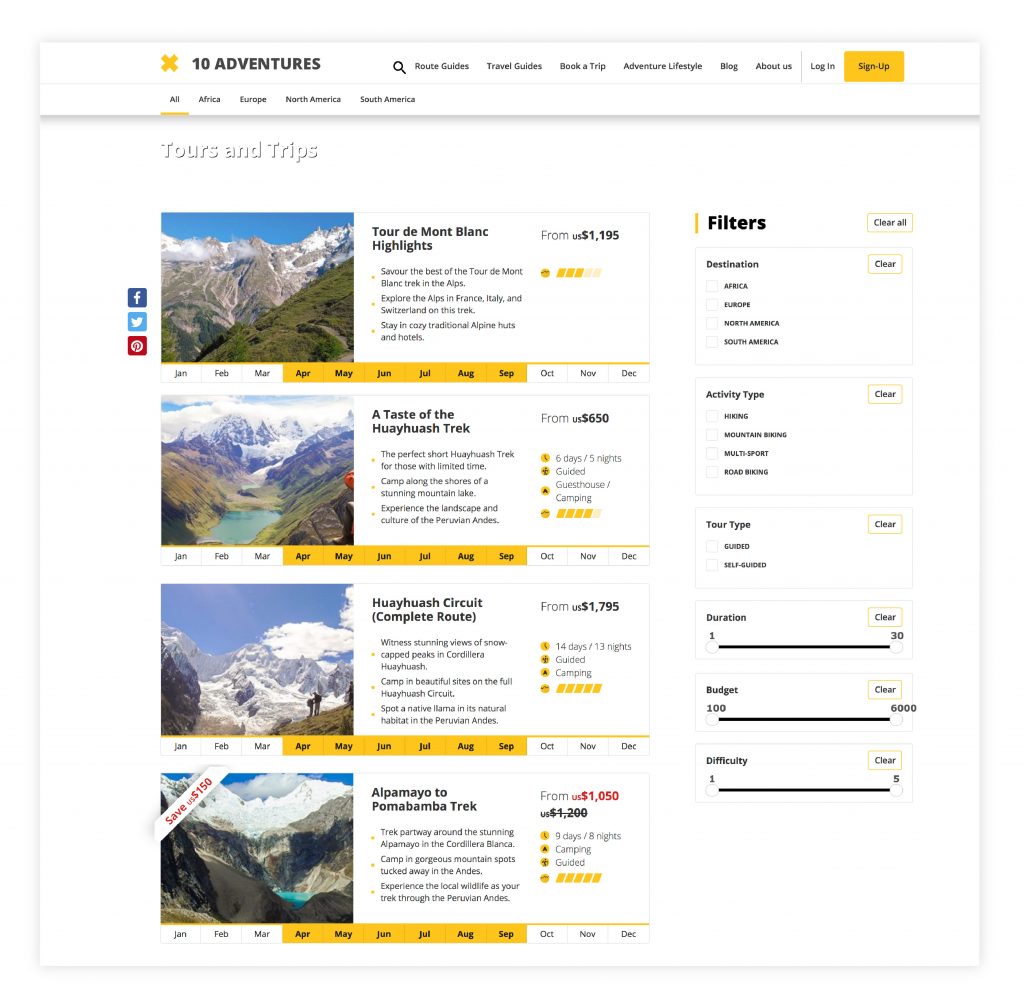
Both the back and front-office interface of your booking application should be welcoming, intuitive, and user-friendly. Make sure the website is mobile-friendly as well: most sites’ interfaces are still poorly adapted to phones, phablets, and tablets.
Booking web apps can be a point of vulnerability since user accounts contain sensitive user data. Specialists should scan the source code regularly to spot vulnerabilities. Penetration tests help diagnose how secure the servers are. Specialists should use containerization and encrypt database and virtual private network (VPN) and transport layer security (TLS) connections. Hotel aggregator sites that provide APIs pull their data via a variety of other third-party tools. It’s worth checking how secure the top hotel metasearch engines are. Make sure to check network weaknesses with penetration tests; take thorough control of authentication and authorization, data security issues, and session management.
Wrapping Up

An online appointment scheduling system is an important feature for most businesses. Searching and booking flights and lodgings are the core of all travel websites and mobile applications. Tech entrepreneurs who decide to create a booking web app as a service can reap the benefits of an online marketplace.
An efficient website booking system is essential, but a proper customer experience involves much more than that. The product should enable the users to:
- search across various options;
- make bookings from any place, anytime, in multiple languages and currencies;
- get last-minute deals and special offers;
- view ratings and read and write first-hand reviews;
- make well-informed decisions about accommodations, flights, tours, and other travel products;
- pay for the services safely and conveniently;
- cancel a reservation easily;
- feel sure their personal information, booking history, and financial details are safe.
Instant messaging, chatbots, and additional cool features will help your service stand out from the crowd. Regardless of the number of features, both the back-office software and booking website interface should be intuitive and user-friendly. The visual design should entice visitors to book trips and lodgings while inspiring confidence and trust.
If you have an idea or questions on how to make a booking app or website for your business — feel free to share them with Alternative-spaces !
Content created by our partner, Onix-systems.
 Home
Home